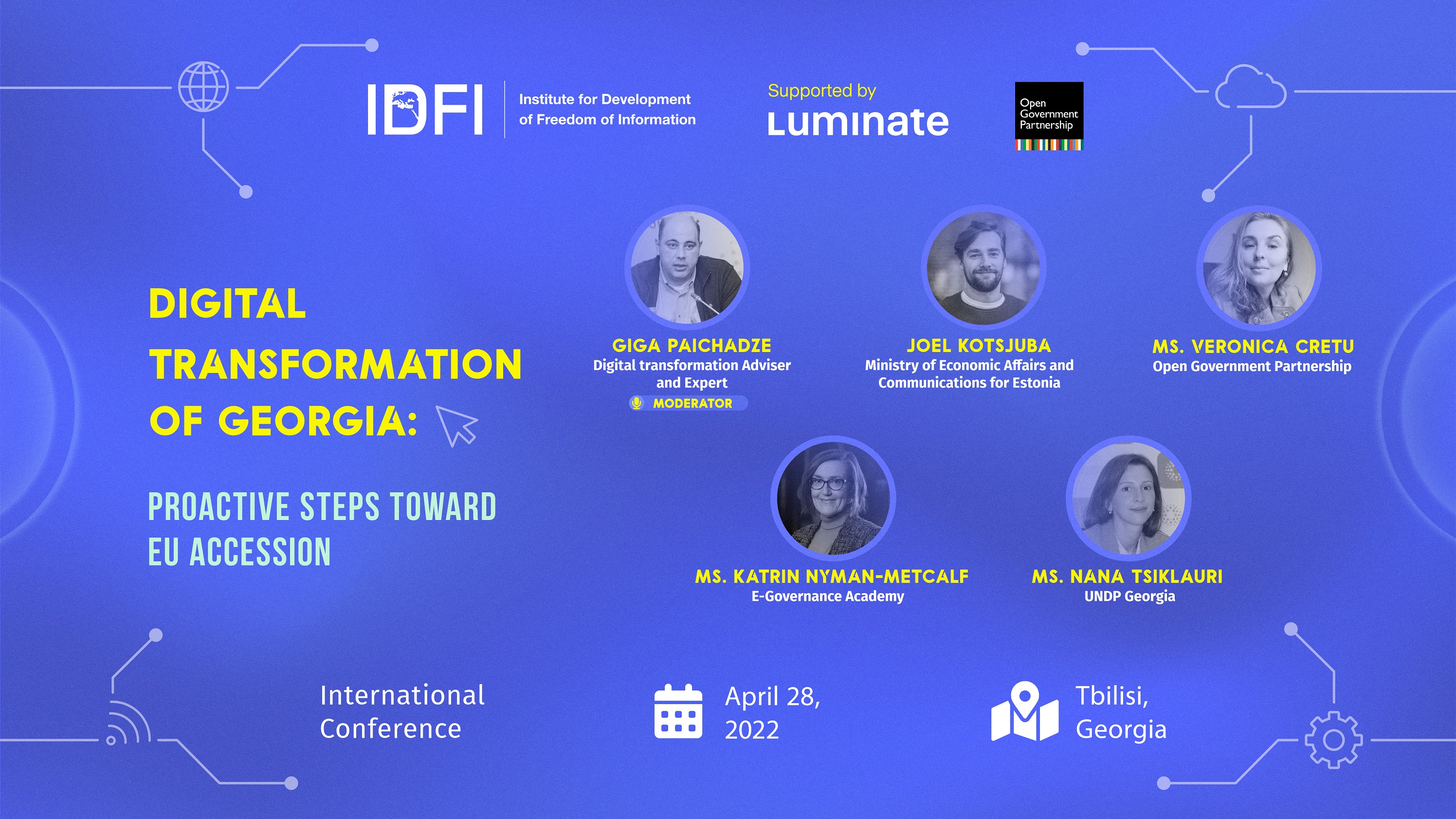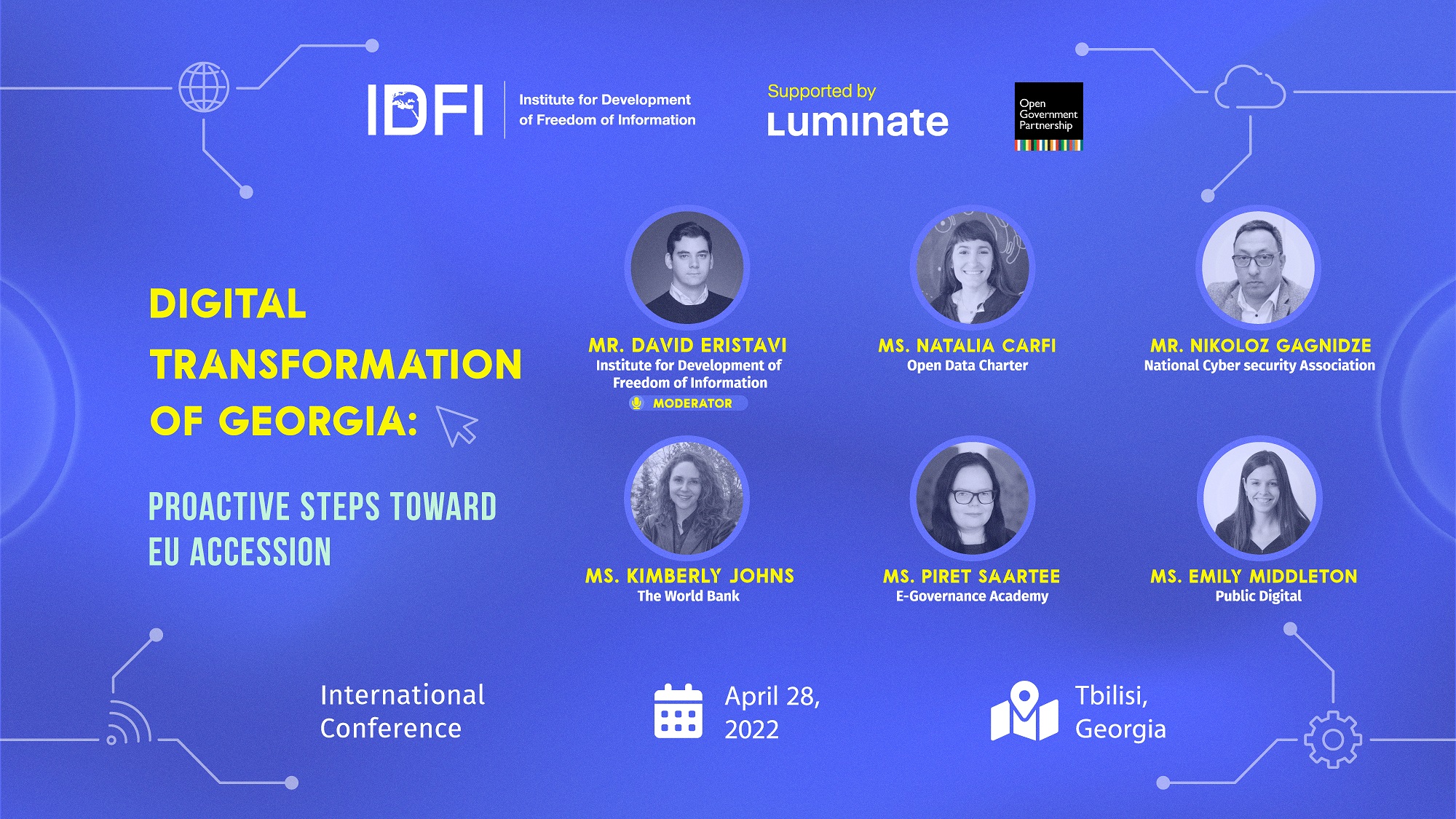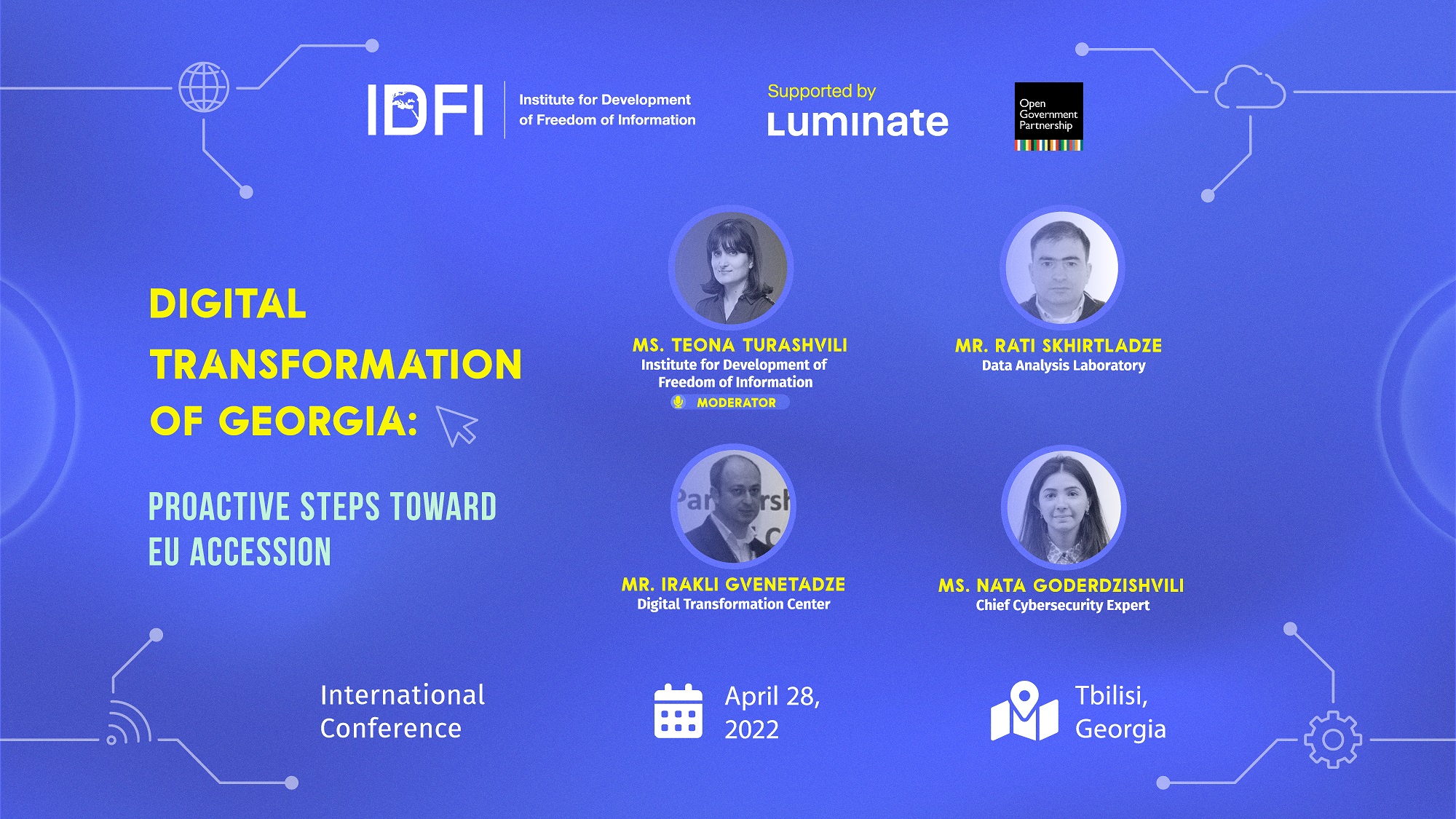


On April 28, 2022, IDFI held an international hybrid conference – Digital Transformation of Georgia: Steps Towards European Integration. The goal of the conference was to contribute to good governance and digital transformation reforms in Georgia by exchanging best practices, especially from Western, Central, and Southern European countries, and fostering debate on the digital transformation of public services, EU standardization, and key enablers and challenges of the digital ecosystem needed for effective digital transformation. To this end, the event brought together local and international experts and all relevant stakeholders from various sectors around several key related issues: digitalization of public services, public sector modernization, effective digital transformation, necessary digital ecosystem, EU standardization, and ambitious reforms in these directions. IDFI held the event in cooperation with the Open Government Partnership (OGP), with the support of the global philanthropic organization, Luminate.
The conference consisted of 3 sessions:
- Digitalization of Public Services: Ambitious Reforms for Public Sector Modernization Amid the Integration with the EU;
- Digital Ecosystem for Effective Digital Transformation: Key Enablers and Challenges;
- Prospects for Georgia: Momentum for Accelerating Public Sector Modernization Reforms.
Mr. Giorgi Kldiashvili, the Executive Director of IDFI, opened and moderated the conference. In his opening remarks, he referred to Georgia's recent application for EU membership and stressed the need for a broad discussion on the digital transformation of the public sector in the context of EU accession, as well as challenges and opportunities for Georgia in the field of public sector modernization and transformation using new technologies.
The first panel, titled – Digitalization of Public Services: Ambitious Reforms for Public Sector Modernization Amid the Integration with the EU - was moderated by Mr. Giga Paitchadze, Digital Transformation Advisor and Expert. The panelists included:
- Ms. Veronica Cretu - Envoy of the Open Government Partnership (OGP) and member of Council of Europe Committees: Committee on AI and Access Info Group (Tromso Convention)
- Joel Kotsjuba – Service Design Advisor, Ministry of Economic Affairs and Communications for Estonia
- Ms. Katrin Nyman-Metcalf - Senior Expert of Legal Framework, e-Governance Academy
- Ms. Nana Tsiklauri - “Supporting Public Administration Reform (PAR) in Georgia” Project Manager, UNDP Georgia

During the panel, the speakers reviewed the latest achievements of Georgia and how they contribute to the harmonization of the Georgian legislation with EU principles, including the adoption of the Service Delivery Strategy by the Government of Georgia, which considers the best practices of prosperous countries. Furthermore, they highlighted a number of public services that are an integral part of the Public Administration Reform (PAR) and already include the mixed models of service delivery, thereby enabling the Georgian government to be more responsive to citizens’ needs and ensure higher transparency and accountability. Furthermore, the panelists emphasized the relevance of digitalization in the public sector, as it is associated with better service delivery and represents the key imperatives and emerging elements for the public sector in modernization.
All panel speakers stressed the importance of the broader participation of international donors, civil society organizations, and other relevant stakeholders in facilitating Georgia's steps forward on the EU integration path.
In the course of the debate, one of the speakers presented a holistic approach to transparency titled "5D transparency", which includes: Data transparency - a critical element of democracy; Process transparency – for instance, in the EU countries, citizens have a wide range of transparency platforms to engage in EU policy-making, including public consultations, petitions to the European Parliament, formal complains, transparency register, etc.; Strategic Transparency - the use of co-creative mechanisms and platforms by the government to get strategic level input from citizens; Transformational transparency – this is about how governments can explore the various roles of citizens and citizen-centric approach to give citizens different roles and bring citizens to the core of transformative processes; Radical transparency – encompassing and ensuring types of transparency listed above, which are institutionalized both vertically and horizontally.
Finally, the vision and concept of the country with regard to technology and digitalization came into focus, as it should not be seen as a standalone element of the reform. It has to be part of the modus operandi, a mindset that has to be anchored in the long-term theory of change. The panelists referred to the countries that need a vision for the next 30-50 years so that the reforms they are building today are sustainable and have a long-lasting impact. The need for a national vision or strategy in terms of Artificial Intelligence was also emphasized. Additionally, one of the speakers mentioned that Georgia has not ratified the Council of Europe Convention on Access to Official Documents and strongly encouraged Georgia to do so.
The second panel, titled - Digital Ecosystem for Effective Digital Transformation: Key Enablers and Challenges - was moderated by Mr. David Eristavi, Analyst, Institute for Development of Freedom of Information (IDFI). Other panelists included:
- Ms. Natalia Carfi - Executive Director, Open Data Charter
- Mr. Nikoloz Gagnidze - Chairman, National Cyber Security Association
- Ms. Kimberly Johns - Senior Public Sector Specialist, The World Bank
- Ms. Emily Middleton – Partner, International Development, Public Digital
- Ms. Piret Saartee - Senior Expert on Smart Governance, e-Governance Academy

The panel speakers talked about the concept of whole-of-government in digital transformation, key enablers and needs, institutional frameworks, relevant state institutions with appropriate powers, and other components, including legislative frameworks and civil society engagement. The panelists also discussed best international practices, significant trends, and lessons for Georgia and other developing countries. One of the speakers presented five lessons learned: Invest in multidisciplinary digital units, work in the open, prioritize ruthlessly, find senior champions, and fix digital funding.
Additionally, the understanding of open data policy was named as one of the most crucial components, as it does not concern only technical solutions/abilities or technical platforms, but also how society is organized and managed. As mentioned during the panel, it also has to do with cultural change, so promoting any open data policy is critical since open data policy is not only about data, but also about people. Therefore, achieving the right balance between data collection and privacy has been named as one of the key components of data policy.
Finally, the panelists touched on the benefits of digital transformation of public administration and governance for countries, issues related to cybersecurity, the role of digital transformation, the importance of open data, and, lastly, Georgia's significant achievements and challenges in terms of digital transformation.
The final panel on Prospects for Georgia: Momentum for Accelerating Public Sector Modernization Reforms was moderated by Ms. Teona Turashvili, Local Government & Internet and Innovations Directions Head, Institute for Development of Freedom of Information (IDFI).The panelists included:
- Ms. Nata Goderdzishvili - Chief Cybersecurity Expert
- Mr. Irakli Gvenetadze - CEO, Digital Transformation Center
- Mr. Rati Skhirtladze - Founder, Data Analysis Laboratory

The panel speakers highlighted the acceleration of Georgia's drive toward the European Union, given the fact that Georgia officially applied for EU membership and had received the EU membership questionnaire, which addresses the development of public services and the improvement of its quality and delivery, as well as digital transformation, among other vital issues. The panelists also discussed the developing process of the reforms and strategies related to public sector modernization, as the reform agenda clearly defines how e-government is developing in the country. According to the speakers, however, since information technology is a support process/mechanism for everything that takes place in the country, the policy agenda remains crucial. In the course of the policy agenda, one of the panelists mentioned several key elements, including personnel policy and the termination of IT specialists to the commercial sector, as well as the need for awareness-raising activities for the public regarding the services created by the state.
The panel discussion also stressed the existing weak enforcement mechanisms in the country. Numerous laws/amendments have been elaborated that are not conformably enforced or monitored. According to the speakers, it is also essential to focus on the amendments to the General Administrative Code of Georgia on the digitalization path, which includes the concepts as follows: digital by default, the once-only principle, a one-stop-shop, etc. This process has been underway for years, but is not moving forward. It was also noted that it is essential to ensure more digitization, more electronic services, and widely used services that citizens have not taken to due to a lack of awareness. Finally, the panelists stressed that it is possible to overcome all critical barriers to digital transformation by making it more relevant to Georgian society.
Lastly, the speakers focused on the part of the EU questionnaire that provides assistive technology to persons with disabilities and people with language barriers. They have mentioned the state's role in prioritizing this issue and integrating existing e-services on the state websites for PWDs and people with language barriers.
Please find the full recordings of the Conference Panels: